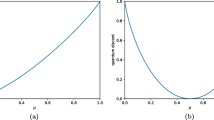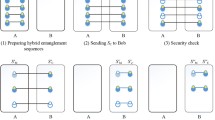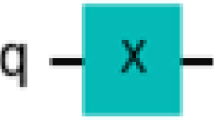Abstract
Key agreement is an important research direction of key management. Different from the key distribution protocol, the key agreement protocol not only needs to ensure the security of the key, but also needs to ensure the fairness between participants. This paper proposed a high-dimensional quantum key agreement protocol by using single-particle states based on quantum Fourier transform, which enables two users with weak quantum ability to negotiate a session key equally with the help of semi-honest quantum server TP. In the protocol, the weak quantum participants do not need to have the ability to measure and store quantum. They only need to be able to perform reflection and unitary operation to complete the key agreement. The main quantum operations are completed by TP, and Alice and Bob can use TP through leasing. Security analysis proves that the proposed protocol can resist both the outside attack and participant attack. Compared with the related semi-quantum key agreement protocol, this protocol has lower resource, higher efficiency and security, which is more suitable for practical application scenarios.


Similar content being viewed by others
References
Zhou, N., Zeng, G., Xiong, J.: Quantum key agreement protocol. Electron. Lett. 40, 1149–1150 (2004)
Liu, S.L., Zheng, D., Cheng, K.F.: Analysis of information leakage in quantum key agreement. J. Shanghai Jiaotong Univ. (Sci.). 11, 219–223 (2006)
Tsai, C. and Hwang, T.: On quantum key agreement protocol. Technical Report, C-S-I-E, NCKU, Taiwan, ROC (2009)
Chong, S.K., Hwang, T.: Quantum key agreement protocol based on BB84. Opt. Commun. 283, 1192–1195 (2010)
Chong, S.K., Tsai, C.W., Hwang, T.: Improvement on “quantum key agreement protocol with maximally entangled states”. Int. J. Theor. Phys. 50, 1793–1802 (2011)
He, Y.F., Ma, W.P.: Two-party quantum key agreement with five-particle entangled states. Int. J. Quantum Inf. 15(03), 1750018 (2017)
He, Y.F., Ma, W.P.: Quantum key agreement protocols with four-qubit cluster states. Quantum Inf. Process. 14, 3483–3498 (2015)
Sun, Z.W., Yu, J.P., Wang, P.: Efficient multi-party quantum key agreement by cluster states. Quantum Inf. Process. 15, 373–384 (2016)
Shi, R.H., Zhong, H.: Multi-party quantum key agreement with bell states and bell measurement. Quantum Inf. Process. 12, 921–932 (2013)
Liu, B., Gao, F., Huang, W., Wen, Q.Y.: Multi-party quantum key agreement with single particles. Quantum Inf. Process. 12, 1797–1805 (2013)
Sun, Z., Zhang, C., Wang, B., Li, Q., Long, D.: Improvements on multi-party quantum key agreement with single particles. Quantum Inf. Process. 12, 3411–3420 (2013)
Sun, Z.W., Zhang, C., Wang, P., Yu, J.P., Zhang, Y., Long, D.Y.: Multi-party quantum key agreement by an entangled six-qubit state. Int. J. Theor. Phys. 55, 1920–1929 (2016)
Gu, J., Hwang, T.: Improvement of novel multi-party quantum key agreement protocol with GHZ states. Int. J. Theor. Phys. 56, 3108–3116 (2017)
Cai, B.B., Guo, G.D., Lin, S.: Multi-party quantum key agreement with teleportation. Mod. Phys. Lett. B. 31, 1750102 (2017)
Wang, P., Sun, Z.W., Sun, X.Q.: Multi-party quantum key agreement protocol secure against collusion attacks. Quantum Inf. Process. 16, 170 (2017)
Boyer, M., Kenigsberg, D., Mor, T.: Quantum key distribution with classical bob. Phys. Rev. Lett. 99(14), 140501 (2007)
Boyer, M., Gelles, R., Kenigsberg, D., Mor, T.: Semiquantum key distribution. Phys. Rev. A. 79(3), 032341 (2009)
Shukla, C., Thapliyal, K., Pathak, A.: Semi-quantum communication: protocols for key agreement, controlled secure direct communication and dialogue. Quantum Inf. Process. 16, 295 (2017)
Yan, L., Zhang, S., Chang, Y.S., Z. W. and Sun Y. Hu.: Semi-quantum key agreement and private comparison protocols using bell states. Int. J. Theor. Phys. 58, 3852–3862 (2019)
Liu, W.J., Chen, Z.Y., Ji, S., Wang, H.B., Zhang, J.: Multi-party semi-quantum key agreement with delegating quantum computation. Int. J. Theor. Phys. 56, 3164–3174 (2017)
Zhou, N.R., Zhu, K.N., Wang, Y.Q.: Three-party semi-quantum key agreement protocol. Int. J. Theor. Phys. 59, 663–676 (2020)
Li, H.H., Gong, L.H., Zhou, N.R.: New semi-quantum key agreement protocol based on high-dimensional single-particle states. Chin. Phys. B. 29(11), 110304 (2020)
Chuan, W., Deng, F.G., Li, Y.S., Liu, X.S., Long, G.L.: Quantum secure direct communication with high-dimension quantum superdense coding. Phys. Rev. A. 71, 044305 (2005)
Wang, J., Yang, J.Y., Fazal, I., Ahmed, N., Yan, Y., Huang, H., Ren, Y., Yue, Y., Dolinar, S., Tur, M.: Terabit free-space data transmission employing orbital angular momentum multiplexing. Nat. Photonics. 6, 488–496 (2012)
Kamil, B., Mohammad, M., Robert, F., Anne, B., Robert, B.: Finite-key security analysis for multilevel quantum key distribution. New J. Phys. 18, 073030 (2016)
Ye, C.Q., Ye, T.Y.: Circular multi-party quantum private comparison with n-level single-particle states. Int. J. Theor. Phys. 58, 1282–1294 (2019)
Cai, Q.Y.: Eavesdropping on the two-way quantum communication protocols with invisible photons. Phys. Lett. A. 351(1–2), 23–25 (2006)
Li, X.H., Deng, F.G., Zhou, H.Y.: Improving the security of secure direct communication based on the secret transmitting order of particles. Phys. Rev. A. 74(5), 054302 (2006)
Deng, F.G., Li, X.H., Zhou, H.Y., Zhang, Z.J.: Improving the security of multiparty quantum secret sharing against Trojan horse attack. Phys. Rev. A. 72(4), 044302 (2005)
Cabello, A.: Quantum key distribution in the Holevo limit. Phys. Rev. Lett. 85, 5635 (2000)
Bechmann-Pasquinucci, H., Tittel, W.: Quantum cryptography using larger alphabets. Phys. Rev. A. 61(6), 062308 (2000)
Chau, H.F.: Unconditionally secure key distribution in higher dimensions by depolarization. IEEE Trans. Infor. Theory. 51(4), 1451–1468 (2005)
Nikolopoulos, G.M., Ranade, K.S., Alber, G.: Error tolerance of two-basis quantum-key-distribution protocols using qudits and two-way classical communication. Phys. Rev. A. 73(3), 032325 (2006)
Sasaki, T., Yamamoto, Y., Koashi, M.: Practical quantum key distribution protocol without monitoring signal disturbance. Nature. 509(7501), 475–478 (2014)
Yin, Z.Q., Wang, S., Chen, W., Han, Y.G., Wang, R., Guo, G.C., Han, Z.F.: Improved security bound for the round robin-differential-phase-shift quantum key distribution. Nat. Commun. 9(1), 1–8 (2018)
Iqbal, H., Krawec, W.O.: High-dimensional semiquantum cryptography. IEEE Trans. Quantum Eng. 1, 1–17 (2020)
Doda, M., Huber, M., Murta, G., Pivoluska, M., Plesch, M., Vlachou, C.: Quantum key distribution overcoming extreme noise: simultaneous subspace coding using high-dimensional entanglement. Phys. Rev. Appl. 15(3), 034003 (2021)
Cozzolino, D., Lio, B.A., Bacco, D., Oxenlowe, L.K.: High-dimensional quantum communication: benefits, progress, and future challenges. Adv. Quantum Technol. 2(12), 1900038 (2019)
Acknowledgments
This work is supported by the National Natural Science Foundation of China (Nos. 62076042, 62102049), the Key Research and Development Project of Sichuan Province (Nos. 2022NSFSC0535, 2021YFSY0012, 2021YFG0332), the Key Research and Development Project of Chengdu (No.2021-YF05-02424-GX), the Innovation Team of Quantum Security Communication of Sichuan Province (No.17TD0009).
Author information
Authors and Affiliations
Corresponding author
Additional information
Publisher’s Note
Springer Nature remains neutral with regard to jurisdictional claims in published maps and institutional affiliations.
Rights and permissions
About this article
Cite this article
Lili, Y., Shibin, Z., Yan, C. et al. Mutual Weak Quantum Users Key Agreement Protocol Based on Semi-Honest Quantum Server. Int J Theor Phys 61, 198 (2022). https://doi.org/10.1007/s10773-022-05161-3
Received:
Accepted:
Published:
DOI: https://doi.org/10.1007/s10773-022-05161-3




